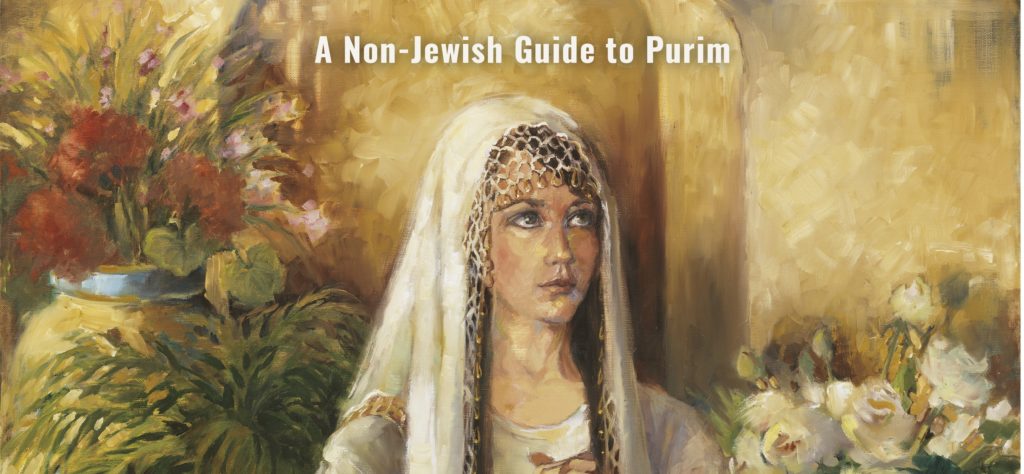A non-Jewish Guide to Purim
Many people are familiar with the story of Esther and her incredible faith, but did you realize that there is an entire Jewish holiday dedicated to honoring and celebrating her story? Purim is the celebration of Queen Esther and how she miraculously saved the Jewish people.

Esther, a humble Jewish girl, caught the eye of King Ahasuerus—who had just sentenced his previous wife to death for not following his orders—and soon became his new queen. Esther did not reveal her nationality to the king at this time. The current prime minister of the empire, Haman, was an anti-Semitic who sought the death of Mordecai, Esther’s cousin. Haman was angry that Mordecai refused to bow down to him and convinced the king to issue an extermination order against the Jews. The name Purim, or “lots,” came from Haman choosing the 13th day of Adar as the date of the extermination by doing a lottery.
Mordecai convinced all of the Jews to repent, fast and pray while Esther asked the king to join her for a feast. Approaching the king without being summoned was not allowed and if the king had been unhappy with Esther for doing this she could have been killed. With great faith, Esther revealed her Jewish heritage to the king during the feast and pleaded with the king to stop Haman’s plans. The king listened to Esther and instead of killing her, he had Haman killed and issued a new decree allowing the Jews the right to defend themselves.
Purim begins this year on the evening of March 16, and many Jews will participate in the following ways to commemorate the holiday.
Reading the book of Esther (the megilllah)
Jews head to their synagogue to hear the entire book of Esther, or the megilllah. The megilllah is read from a handwritten parchment scroll, using an age-old tune. The story should be listened to once on Purim night and again on Purim day. When Haman’s name is mentioned, noisemakers (graggers) are twirled and people stomp their feet to eradicate his evil name. Purim is the only time when there is a mitzvah (commandment) to make noise!
Send food to friends (Mishloach Manot)
Purim emphasizes the importance of community and friendship by sending food to friends. Observers are expected to send a package with at least two different ready-to-eat food items or beverages to at least one Jewish friend during the daylight hours of Purim. A traditional Jew might send “Haman’s pockets” or hamentaschen, which are triangular, fruit-filled cookies to represent Haman’s three-cornered hat. Men send to men and women to women. Gifts are usually delivered by a third party and children are also expected to send their own gifts to friends.
Giving to the needy (Matanot La’Evyonim)
Another one of Purim’s primary themes is Jewish unity, because the Jews were persecuted and saved together. Purim’s special emphasis is on supporting the less fortunate and observers are asked to give money or food to at least two needy people during the daylight hours of Purim. Even small children are asked to observe this mitzvah.
Feast
Prior to Purim, Jews will fast to commemorate Esther’s three day fast before approaching the king. During the Purim day, families gather and invite guests to enjoy a festive Purim meal. The meal begins before sundown and lasts into the evening. The tables are festive with nice tablecloths and candles. The family washes for bread (challah) and enjoys the meal with meat, wine, Jewish songs and words of the Torah.
The Jews also include special prayers on Purim that describe the Purim story and thank God for the redemption of their ancestors. The Torah is read in the morning and Exodus 17:8-16 is read, which describes the battles of Haman’s ancestral nation almost one thousand years before Purim occurred. Children often dress as Mordechai and Esther and participate in a masquerade party at the synagogue.
“And in every province, and in every city, whithersoever the king’s commandment and his decree came, the Jews had joy and gladness, a feast and a good day. And many of the people of the land became Jews; for the fear of the Jews fell upon them.” (Esther 8:17)



